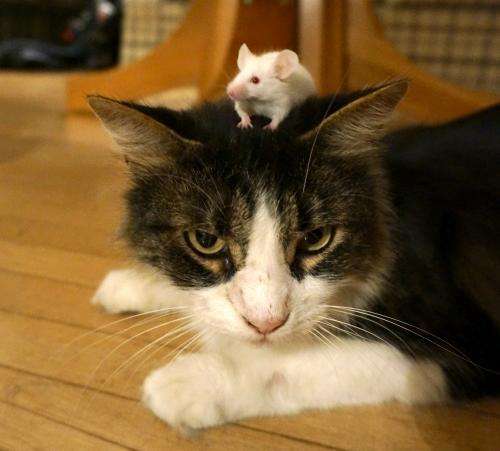Toxoplasma-infected mice remain unafraid of cats even after parasite clearance

Chronic infection with the parasite Toxoplasma gondii can make mice lose their innate, hard-wired fear of cats. This loss of their innate fear may persist after the parasite is no longer detectable in their brains, suggesting that initial infection may cause permanent changes in the mechanisms underlying their fear of predators. The results are published September 18 in the open access journal PLOS ONE by Wendy Ingram and colleagues from the University of California, Berkeley.
The Toxoplasma parasite can be deadly, causing spontaneous abortion in pregnant women or killing immune-compromised patients, but it has even stranger effects in mice.
Infected mice lose their fear of cats, which is good for both cats and the parasite, because the cat gets an easy meal and the parasite gets into the cat's intestinal track, the only place it can sexually reproduce and continue its cycle of infection.
New research by graduate student Wendy Ingram at the University of California, Berkeley, reveals a scary twist to this scenario: the parasite's effect seem to be permanent. The fearless behavior in mice persists long after the mouse recovers from the flu-like symptoms of toxoplasmosis, and for months after the parasitic infection is cleared from the body, according to research published today (Sept. 18) in the journal PLOS ONE.
"Even when the parasite is cleared and it's no longer in the brains of the animals, some kind of permanent long-term behavior change has occurred, even though we don't know what the actual mechanism is," Ingram said. She speculated that the parasite could damage the smell center of the brain so that the odor of cat urine can't be detected. The parasite could also directly alter neurons involved in memory and learning, or it could trigger a damaging host response, as in many human autoimmune diseases.
Ingram became interested in the protozoan parasite, Toxoplasma gondii, after reading about its behavior-altering effects in mice and rats and possible implications for its common host, the domesticated cat, and even humans. One-third of people around the world have been infected with Toxoplasma and probably have dormant cysts in their brains. Kept in check by the body's immune system, these cysts sometimes revive in immune-compromised people, leading to death, and some preliminary studies suggest that chronic infection may be linked to schizophrenia or suicidal behavior.

Pregnant women are already warned to steer clear of kitty litter, since the parasite is passed through cat feces and can cause blindness or death in the fetus. One main source of spread is undercooked pork, Ingram said.
With the help of Michael Eisen and Ellen Robey, UC Berkeley professors of molecular and cell biology, Ingram set out three years ago to discover how Toxoplasma affects mice's hard-wired fear of cats. She tested mice by seeing whether they avoided bobcat urine, which is normal behavior, versus rabbit urine, to which mice don't react. While earlier studies showed that mice lose their fear of bobcat urine for a few weeks after infection, Ingram showed that the three most common strains of Toxoplasma gondii make mice less fearful of cats for at least four months.
Using a genetically altered strain of Toxoplasma that is not able to form cysts and thus is unable to cause chronic infections in the brain, she demonstrated that the effect persisted for four months even after the mice completely cleared the microbe from their bodies. She is now looking at how the mouse immune system attacks the parasite to see whether the host's response to the infection is the culprit.
"This would seem to refute – or at least make less likely – models in which the behavior effects are the result of direct physical action of parasites on specific parts of the brain," Eisen wrote in a blog post about the research.
"The idea that this parasite knows more about our brains than we do, and has the ability to exert desired change in complicated rodent behavior, is absolutely fascinating," Ingram said. "Toxoplasma has done a phenomenal job of figuring out mammalian brains in order to enhance its transmission through a complicated life cycle."
More information: Ingram WM, Goodrich LM, Robey EA, Eisen MB (2013) Mice Infected with Low-Virulence Strains of Toxoplasma gondii Lose Their Innate Aversion to Cat Urine, Even after Extensive Parasite Clearance. PLoS ONE 8(9): e75246. DOI: 10.1371/journal.pone.0075246
Journal information: PLoS ONE
Provided by Public Library of Science


















